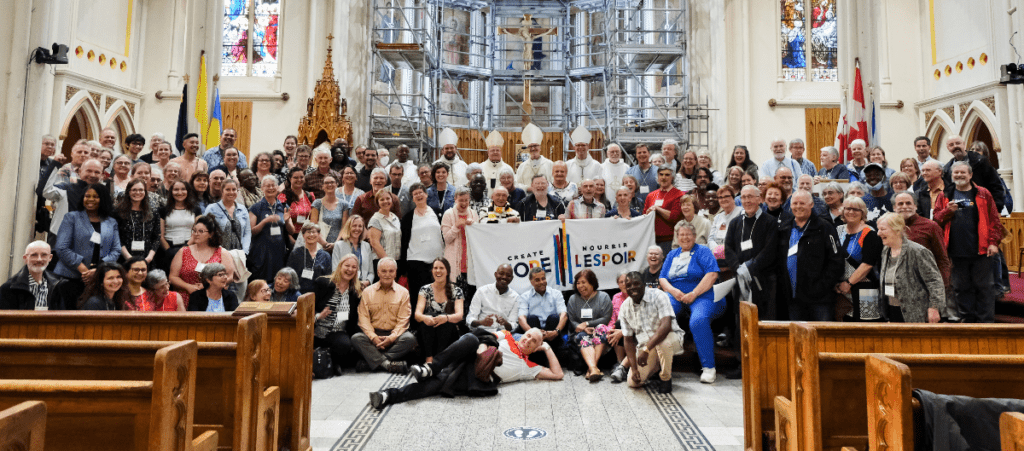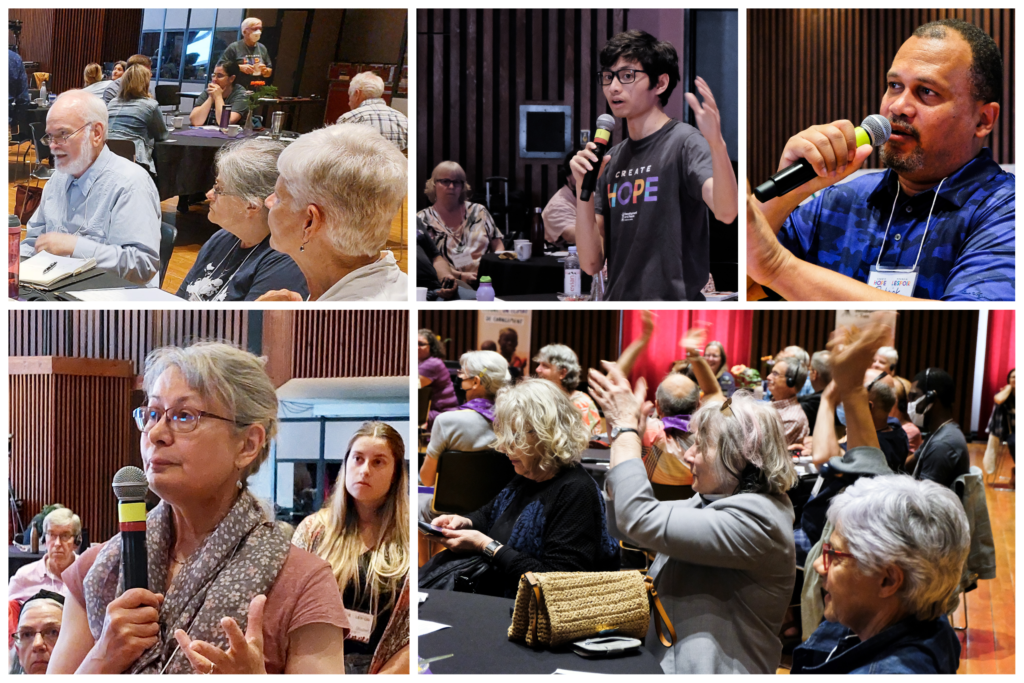

Development and Peace ― Caritas Canada’s 2022 Orientation Assembly, held from June 16 to 19 in Halifax, Nova Scotia, was a great success! Under the theme Create Hope, all those present — from Development and Peace members, including young adult representatives, to National Council and staff members, representatives of our international partners and sister groups, as well as Church leaders, notably keynote speaker Cardinal Michael Czerny, SJ — contributed to a wide range of discussions. The topics included the renewal of our movement, fundraising, and solidarity with marginalized communities in the Global South and the Indigenous peoples of Canada. The end result was a solid roadmap, composed of three overarching orientations and related priorities (below), to guide our movement for the next five years.
But it was not all business! Lots of good fun was had by all. As the pictures reveal, the participants greatly enjoyed spending time together at the Saturday evening dinner and social and having their picture taken with a cut-out of Pope Francis in the photo booth. On fine display at many moments during the assembly were the musical talents of employees, guests and members, such as during this icebreaker. Also, judging by the number of times everyone broke out spontaneously into dance, one would have to say “Jerusalema” by Master KG was the theme song of our 2022 Orientation Assembly.
Lively discussions and debates
On the opening night, the Together Towards Hope panel — composed of Bishop Pierre Goudreault and Development and Peace President Brenda Arakaza, Executive Director Carl Hétu and Asia Program Officer Micheline Lévesque — shared what motivates them to work for Development and Peace. Over the next two days, the delegate discussions and deliberations were inspired and guided by the following speakers and panels.
Keynote address: From Vatican II’s Signs of the Times to the Synodality of the 2020s
- In his address, Cardinal Michael Czerny, SJ, emphasized the fact that living the preferential option for the poor is not about ideas, but about being in close and genuine contact with them. To do so, we must metaphorically and literally walk with them. Development and Peace is also providing the homily that Cardinal Czerny gave at the Mass held on Saturday, June 18, at Saint Mary’s Cathedral Basilica.
Renewing the Movement
- In his talk, Inclusivity and Grace in a Catholic Movement, diversity and inclusion consultant Dr. Lance Dixon reminded us that to be a truly inclusive movement, you have to make an effort to invite people of diverse backgrounds to become involved.
- The Voice of Youth and Young Adults panel — composed of Stéphanie “Taddy” Stringer and Aloysius Wong, both young adult delegates, as well as Caritas Internationalis Youth Programs Coordinator Rebecca Rathbone, CIDSE Campaign Assistant Fanny Schmit and Niagara District School Board teacher Paul Turner — emphasized that young people are interested in the work of Development of Peace but sometimes have trouble becoming involved. Their suggested solutions included going into schools and universities more often to talk to youth and young adults.
- Carl Hétu and Development and Peace Communications Director Genevieve Gallant gave workshops on extending our campaigns beyond Share Lent and to new audiences.
The Global Movement
- In her talk, Living the Church of the Poor, Sr Jean Bellini of the Pastoral Land Commission (CPT) explained how her organization is accompanying some of Brazil’s most marginalized communities in their struggle for reforms guaranteeing their access to land.
- During his talk, The Triple Nexus: Aid, Development and Peace Building, Caritas Internationalis Secretary General Aloysius John reminded us that we are not project-making machines, that our work is animated by the Spirit, and that we must therefore be the voice of the voiceless.
- Chan Ramy, Executive Director of the Youth Resource Development Program (YRDP) in Cambodia, could not be present but sent a video message highlighting the ways in which her organization engages young people.
Integral Approaches to Development
- The Approaches to Women’s Empowerment panel — composed of theologian Françoise Lagacé, KAIROS Executive Director Aisha Francis, Charlottetown Diocesan Council Chairwoman Mary Boyd, CM, and Hélène Gobeil of AQOCI — explored ways of improving our women’s programs. For example, Françoise Lagacé’s presentation examined the way in which Jesus included women in his mission and its significance for questions surrounding partnership and synodality.
- Dr. Olga Issa of Caritas MONA could not be present but sent a video message mentioning the challenges her organization faces encouraging women to be involved in their communities in a culture that is against their participation.
- In his talk, Together for Climate Justice, Dr. Isaac Asume Osuoka of the Social Development Integrated Centre (Social Action) in Nigeria discussed how Western corporate activities over the centuries have shaped the current sociopolitical and ecological realities of Africa.
Solidarity in Reconciliation
- In his talk, Reflections by a Catholic Indigenous Elder, the Honourable Graydon Nicholas, CM, ONB, of the Tobique First Nation, shared his thoughts on how evangelization went amuck and the need to teach the history of Canada’s residential school system in schools. In this interview, he proposes ways for regular people to approach reconciliation.
- The Role of Development and Peace in Reconciliation panel — composed of Genevieve Gallant, KAIROS Program Manager Ed Bianchi and the Archdiocese of Regina’s Social Justice Coordinator, Tashia Toupin, with an introduction by youth delegate Andrea DeSouza — pointed out that our mission is not only to support partners in the Global South, but also to educate Canadians on the causes of injustice, including in our own country. We therefore need to educate ourselves on the history of the residential school system and to go out and build relationships with our Indigenous neighbours. As one delegate told us after the talks on reconciliation:
I learnt the importance of moving forward in our relationship with the Indigenous peoples of Canada, our neighbours, in order to do something on this issue. — Denis Vaillancourt, Matane diocesan council member, Quebec
Our priorities for the next five years
The final morning, following a lively debate on the themes and their wording, the delegates voted in favour of the following three orientations and associated priorities:
- Orientation 1 – Renew the movement
- Priority 1.1 – Be a prophetic witness of Catholic Social Teaching in our communities and in the world
- Priority 1.2 – Prioritize the youth movement
- Priority 1.3 – Strengthen our democratic structures


- Orientation 2 – Living synodality
- Priority 2.1 – Walk together as the Church in Canada
- Priority 2.2 – Walk together in our local and global networks
- Priority 2.3 – Walk together with social movements for structural change
- Orientation 3 – Integral communities for integral ecology
- Priority 3.1 – Climate and ecological justice
- Priority 3.2 – Women’s rights and leadership
- Priority 3.3 – Strong civil society
- Priority 3.4 – A “triple nexus” approach
- Priority 3.5 – Our role in reconciliation [with the First Nations, Inuit and Métis peoples of Canada]
The member experience
In their feedback, many delegates told us how much they appreciated having this opportunity to meet in person and have meaningful discussions with other members and employees from across the country. It heightened their sense of community and generated excitement in them for the future. The delegates also really enjoyed the lively and fun moderation provided by the very talented animators, not to mention the thought-provoking presentations given by the guest speakers and panels. The range of presentations on issues that our movement needs to address — such as the nature of partnership and the need for reconciliation with the Indigenous peoples of Canada — was particularly appreciated. The feeling of community, the platform given to the young adult delegates and the lack of hierarchy at the assembly were also noted as definite positives for our democratic movement. In the words of one person:
[…] it felt like everyone was truly walking in synodality. — anonymous feedback
Of course, there was also constructive criticism. For example, there were technical issues, but most of all, not enough time was set aside for the final deliberations. We closely read all the comments, and next time we will do better.
The importance of this assembly
This fall, Development and Peace will begin developing a new strategic plan based on the 2022 Orientation Assembly’s orientations and priorities, which will shape our work over the next five years. However, the assembly is also important for our members as individuals. As one member told us about the assembly:
It equips me to speak positively about Development and Peace and in an up-to-date manner with parish priests in my network for social action. It offers an expanded network for me, which is crucial in my work for social action. — anonymous feedback
In sum, the 2022 Orientation Assembly was a great opportunity for us as a movement — after more than two years of COVID-19 social-distancing — to reconnect with each other, reaffirm our values and prepare ourselves to move forward, energized and excited for the future of our movement. Thank you to all of our members for your commitment and hard work! We are truly looking forward to implementing our new priorities as we continue our journey together over the next five years!


